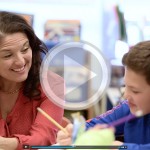Thomas Kehle, professor of school psychology in the Neag School, passed away on Feb. 7, 2018.

In Memoriam: Professor Thomas Kehle
February 8, 2018
Read stories related to faculty experts at UConn’s Neag School of Education.

February 8, 2018
Thomas Kehle, professor of school psychology in the Neag School, passed away on Feb. 7, 2018.
February 8, 2018
Joshua Hyman, an assistant professor at University of Connecticut, studied the effects of this new policy (required ACT testing) while he was a graduate student at the University of Michigan. Hyman analyzed the test scores and college attendance of all public, high school students in Michigan, before and after the ACT was made universal.
February 8, 2018
This is why — as researchers who have focused on absenteeism and better ways to keep students engaged — we found the recent report about students graduating from Ballou High School in Washington, D.C., despite missing large amounts of school so concerning.

February 2, 2018
Each year, more than half a million students drop out of high school in the United States. But what if schools could predict which individuals were most at risk for dropping out — and perhaps even take action to prevent such an outcome? As it turns out, such a scenario is closer than ever to becoming a reality.
January 31, 2018
To help pass legal muster, parochial schools should adopt a secular curriculum, change their names, and keep a separate accounting system, said Preston Green, a professor at the University of Connecticut who explored the legal questions of churches operating charter schools in a 2001 law review article.
January 30, 2018
“We find consistent evidence that both implementing high-stakes evaluation reforms and repealing tenure reduced teacher labor supply,” concludes the paper, which controlled for a number of factors that might have affected the pool of teachers.
January 25, 2018
“The teacher (or some human) still has to find a time to sit down and listen to all the recordings — usually during time set aside for lunch, planning or beyond school hours since they certainly can’t score them when they are teaching,” says Rachael Gabriel, an assistant professor of literacy education at the University of Connecticut.
January 24, 2018
Some worry that career and technical education (CTE) will steer students away from college. But a recent study by Shaun M. Dougherty at the Thomas B. Fordham Institute concluded that CTE courses had no effect on a student’s chances of going to a four-year college. In fact, the study found that students on a CTE track were marginally more likely to attend a two-year college and 21 percent more likely to graduate high school.

January 16, 2018
Our alumni, faculty, and students reflect on their experience in the Neag School in this special video segment. Video produced by Nathan Oldham.
January 9, 2018
Sarah Woulfin, an assistant professor of education at the University of Connecticut who was hired as a California teacher with an emergency credential in 2000 to help combat the shortage of instructors, told The 74 that she believed more could be done to help educators exploit the possibilities of lower class sizes.